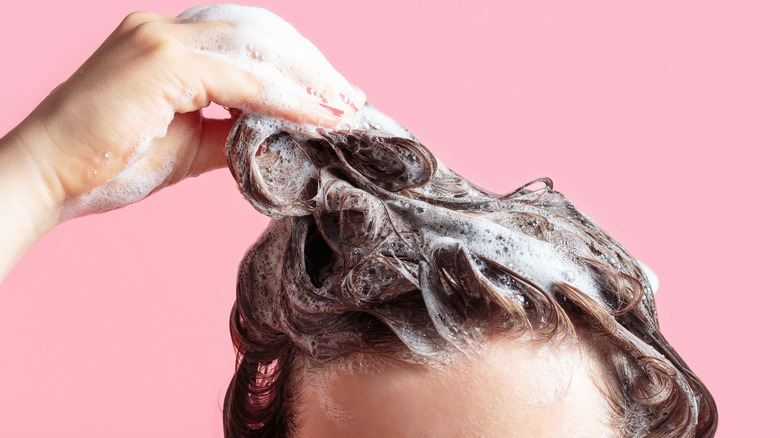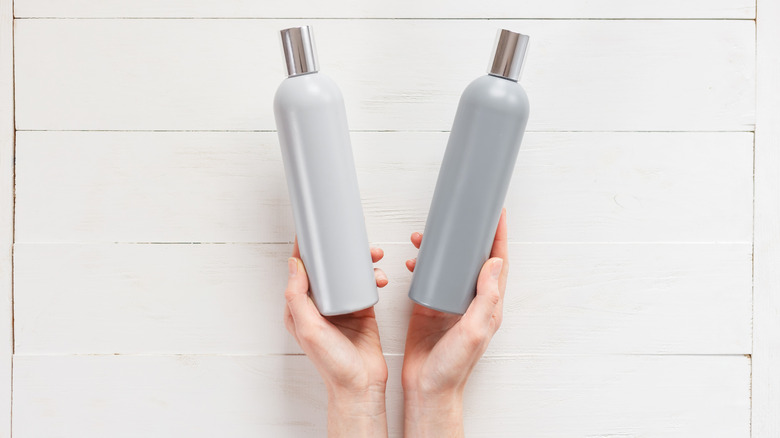Is There An Actual Difference Between Men's And Women's Shampoos?
We may receive a commission on purchases made from links.
Gender is becoming more fluid, but this shift might take time to hit the aisles of your local drugstore. For the last few centuries, personal goods have been highly gendered. "Westernization and colonization created our sense of what femininity and masculinity is," according to skincare brand Good Light founder and "Pretty Boys" author, David Yi, per The Zoe Report. Yi notes that beauty began to diverge between the sexes at the end of the 1700s, eventually leading to today's gendered commodities.
One could argue that some gendered products make sense, such as footwear based on men's and women's shoe sizes or multivitamins that target sex-specific health concerns. But in some cases, slapping on a men's or women's label may be little more than a marketing ploy — and an excuse to hike up the prices of items sold to women commonly called the "pink tax" (via The Balance). For some examples, hit up the body care sections of a supermarket or drugstore. You'll likely find women's razors, deodorants, and other products separate from men's. If you've ever borrowed a boyfriend's razor or used a unisex deodorant brand, you may already realize that these products rarely have reason to be gendered.
Haircare, on the other hand, can be a bit more confusing. After all, men often only have to manage hair that's an inch or two long, while women generally have a full, flowing mane to care for. But should you really limit yourself to shampoo products marketed to women?
The difference between men's and women's shampoos
A meme once floated around the internet poking fun at the difference between men's and women's shampoos. In the viral image, a woman looks at a bottle of shampoo for dry, damaged hair, while a man looks at a 6-in-1 shampoo that promises to wash the entire body and even the car and dishes too.
Though the meme may be funny, it is true that all-in-one hair products are commonly aimed at men, not women. Jacqui Davis, a hairstylist and salon owner, explained to The Washington Post that 2-in-1 shampoos and conditioners and 3-in-1 (a 2-in-1 that can also act as a body wash) products are formulated primarily for "convenience and ease," rather than actual haircare. That means they may not be suitable for dryness, dandruff, and other hair and scalp issues.
Standard men's shampoos, on the other hand, tend to target specific needs. "Men's shampoos can often be more cleansing [than women's] and promote scalp health because of men's scalp issues," Vaughn, celebrity hairdresser and founder of V76 by Vaughn, shared with StyleCaster. Meanwhile, beauty retailer Sephora states on its website that women's shampoos are more gentle and "often lower in alcohol than men's shampoos, which makes them less drying and more likely to be compatible with curly or coily hair."
Can women use men's shampoo?
Whether you want to avoid the pink tax or just enjoy the simplicity of men's shampoos, you might consider borrowing from the boys. Mark DeBolt, celebrity colorist and salon co-founder, confirmed to Byrdie that women can typically use men's shampoo if they wish.
There are some instances, though, where the made-for-men versions are better left on the shelf. When it comes to all-in-one hair products, Trefor Evans, the director of research at TRI Princeton, explained to The Washington Post that people with short hair "can probably get away with using the two-in-one." But if you're the proud owner of long locks, he strongly advises against it. Haircare brand Zenagen also says that shampoo formulated for hair loss differs by gender because men and women often lose hair for different reasons. Therefore, it suggests sticking to your sex's product line when available.
Dandruff treatment, too, can require different formulations for men and women. A 2018 study published in the International Journal of Cosmetic Science revealed that shampoos containing 1% zinc pyrithione were more effective in treating males' dandruff than females'. For women, gentler products that also moisturize may be a better fit. In the end, if your hair is short or if moisture and other hair woes aren't an issue, consider grabbing a bottle of men's shampoo during your next shopping run. But if you have more complex haircare needs, choose a formulation designed with your hair in mind.


